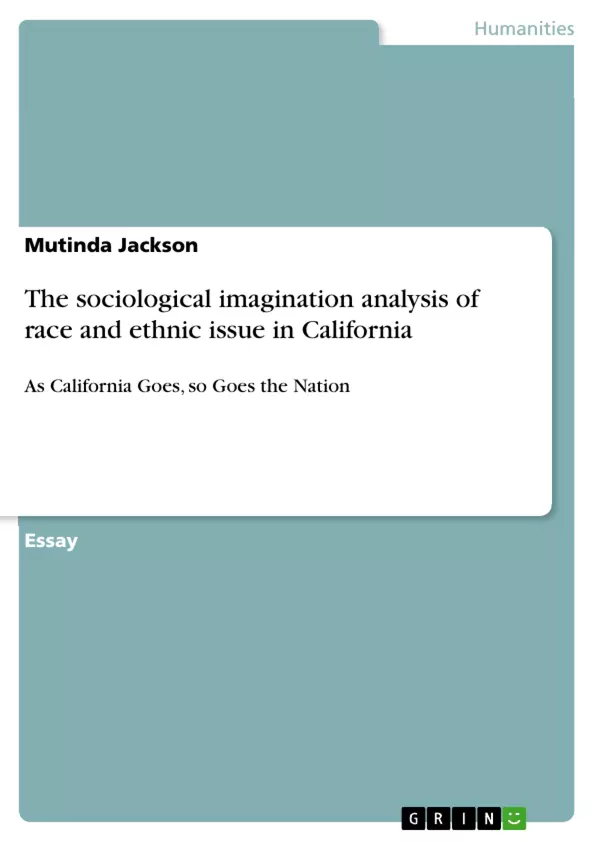This essay will explore the sociological imagination analysis of race and ethnic issue in California and the national immigration issue by covering the following paradigms: structural functionalism, symbolic interaction and social conflict perspective.
Evidently, the two sides of the United States’ political divide have utilized the opportunity to accentuate the manner through which California is different from the rest of the nation. For years, Americans have recognized California as the Golden State, maintaining that it was initially a distant and dreamy land, then as a cultural shaper and as a promised land for millions and millions of Americans and immigrants. While it remains to be America’s most populated state, attributed to a great success story, there are many areas where it has failed to live up to its promise.
Notably, California is a demographic giant, an aspect implying that its respective issues correlate with those of the entire nation. The history of California is characterized by a constant change, owing its preeminence to its natural advantages such as the vast geographic area and pleasant climate and to human ingenuity. In this respect, it is imperative to note that its proximity to Mexico has forced the State to continue experiencing unprecedented population growth by Latinos who highly contribute to the ever-changing nature of California society, its politics and culture. It is unfortunate to note that, currently, spiteful characterizations of immigrants together with draconian plans for their marginalization have been drifted by diverse political figures to a startlingly receptive public; an aspect linked to the California Proposition 187.
Table of Contents
- California and the Nation
- California: A Demographic Giant
- California Politics
- The Nature of Power and the State
- The Role of Immigration in California
- Ethnic Context and Racial Attitudes
- Sociological Perspectives on Race and Ethnicity
Objectives and Key Themes
This essay aims to analyze the sociological imagination of race and ethnic issues in California, specifically focusing on the national immigration issue. The essay examines these issues through the lens of three prominent sociological perspectives: structural functionalism, symbolic interactionism, and social conflict theory.
- The significance of California as a demographic giant and its role in shaping national political discourse.
- The impact of immigration on California's ethnic landscape and the evolving relationship between different ethnic groups.
- The influence of political structures and social institutions on race and ethnic relations in California.
- The role of symbolic interactionism in understanding how race and ethnicity are constructed and interpreted in society.
- The implications of social conflict theory in analyzing power dynamics and inequality related to race and ethnicity.
Chapter Summaries
- The essay begins by discussing the significance of California as a state that often reflects broader national trends. It emphasizes the state's demographic diversity and the impact of immigration, particularly from Mexico.
- The essay then explores the political landscape of California, highlighting the dominance of the Democratic and Republican parties and the presence of various other political organizations.
- The essay delves into the nature of power and the role of the state, particularly during times of political exceptionalism. It examines how these factors influence social structures and societal dynamics.
- The essay explores the impact of immigration on California's ethnic landscape, focusing on the increasing Latino and Asian populations and the resulting competition and conflict among different ethnic groups.
- The essay investigates the connection between ethnic context, racial attitudes, and voting behavior, drawing on a survey conducted prior to the vote on Proposition 209. This section examines how different ethnic groups perceive issues such as affirmative action and immigration.
Keywords
The essay revolves around the key themes of race, ethnicity, immigration, sociological perspectives, structural functionalism, symbolic interactionism, social conflict theory, California politics, demographic changes, ethnic relations, and power dynamics.
Frequently Asked Questions
What is the "sociological imagination" analysis of California?
It is an approach that examines race and ethnic issues in California through paradigms like structural functionalism, symbolic interaction, and social conflict theory.
Why is California called a "demographic giant"?
As America's most populated state with a massive Latino and Asian population, California's demographic changes reflect and shape trends for the entire nation.
What was the impact of California Proposition 187?
Proposition 187 is linked to draconian plans for the marginalization of immigrants and reflects the tensions and racial attitudes in California's political history.
How does social conflict theory apply to ethnic issues in California?
It analyzes the power dynamics, inequality, and competition between different ethnic groups, particularly in the context of immigration and political representation.
What role does immigration play in California's politics?
Immigration, especially from Mexico, has forced the state to adapt its culture and politics, leading to both unprecedented population growth and significant political divide.
- Arbeit zitieren
- Dr. Mutinda Jackson (Autor:in), 2016, The sociological imagination analysis of race and ethnic issue in California, München, GRIN Verlag, https://www.grin.com/document/456779



